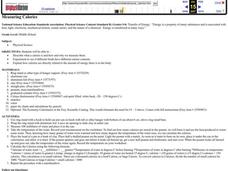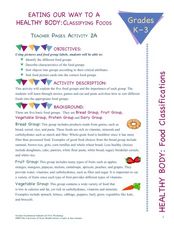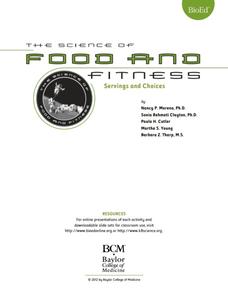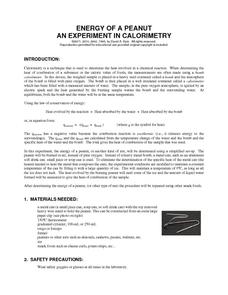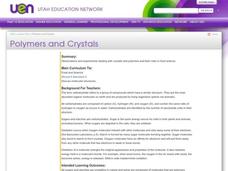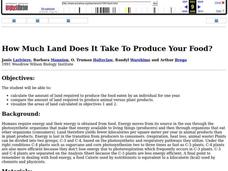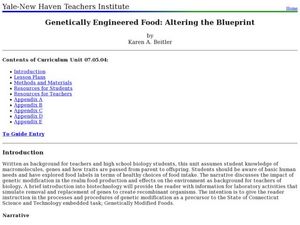University of Georgia
Energy Content of Foods
Why do athletes load up on carbohydrates the evening before a competition? The lesson helps answer this question as it relates the type of food to the amount of energy it contains. After a discussion, scholars perform an experiment...
Curated OER
Fast Fats: A Nutritional Analysis of America's Obsession with Fast Foods
How do you read a nutritional label? Help high schoolers practice reading nutritional labels on foods so they can calculate the calories in different types of foods. They will also examine the effects of fat on the body and the link to...
Curated OER
Math in Science-Knowing the Calories You Take In!
I can burn off one scrambled egg in 30 minutes of walking? Explain how we daily consume and burn calories using this fun worksheet, which breaks down basic foods and activities into kilocalorie equivalents. Nutritionists calculate the...
Nuffield Foundation
How Much Energy Is There in Food?
People associate calories with food, but what is a calorie? Young scientists measure the number of calories in samples of food to better understand the concept. They test a variety of samples, take measurements, and compare their results...
Curated OER
Looking at Food Labels
Students interpret the food and nutrition on food labels. They determine their nutrient needs and how comprehending food labels can help them to meet those needs. Pupils recall that food labels provide nutrition information to help...
Texas State Energy Conservation Office
Nuts! Calculating Thermal Efficiency
Oh nuts! Do macadamias or almonds produce more thermal energy? Energy enthusiasts find out with this experiment. The objective is to demonstrate to your class how the chemical energy contained in foods can be converted into useable...
Curated OER
Measuring Calories in Food
Students measure the amount of calories in food. In this food energy instructional activity, students discuss what a calorie is, how our bodies use a calorie, and how many we need. Then, students use a calorimeter to calculate the amount...
Curated OER
What The Peanuts Say: Catabolism and Calories
Students investigate the energy released by a peanut and a piece of a walnut. In this catabolism and calories lesson plan, students burn a peanut and a piece of a walnut and measure the temperature of the water before burning and after...
Curated OER
Calories and Nutrition
In this calories worksheet, students use a chart comparing the calories found in different food items to complete 3 short answer questions.
Curated OER
Food Energy
In this food energy worksheet, students review calories and how calories are determined. Students calculate how much thermal energy it would take to raise certain volumes of water a certain number of degrees. This worksheet has 3 word...
Curated OER
Measuring Calories
Students burn peanuts and marshmallows to determine the calories each contains. For this calorimetry lesson, students set up an apparatus with a ring stand and water in an aluminum can. They record the temperature of the water before and...
Curated OER
Calorie Connection
Young scholars calculate the calories in a Brazil nut and the calories needed for daily intake. In this calories lesson plan, students use calorimetry to measure the change in water temperature heated by the burning of a Brazil nut. They...
Curated OER
Lesson 1: Fast Food Nutrients
Students compute the nutrient values of fast foods. In this fast food nutrient, students observe a PowerPoint about nutrition. They research nutritional topics, answer questions about nutrition, and determine the nutrient values of...
Curated OER
Measuring Calories
Students investigate what a calorie is and how and why we measure them. They conduct an experiment to compare the calories of a peanut and a mini-marshmallow, and explain and discuss how calories are directly related to the amount of...
Curated OER
Eating Our Way to a Healthy Body: Classifying Foods
Students examine the major food groups. In this classifying foods activity, students discover the 5 food groups as they read books and play games. Students then sort foods into the appropriate food groups
Baylor College
Servings and Choices
An important part of balancing caloric intake to energy expenditure is knowing how many Calories you are consuming. In the fifth of a seven-lesson series on food and energy, learners estimate their daily caloric intake, then use a...
Curated OER
Nutrition -- A Lesson for Life - Biology Teaching Thesis
Students briefly explain the importance of nutrition in their everyday lives, and they tell you about how many calories they should consume in a day. They list readily available and affordable healthy foods that they LIKE to eat....
Kenan Fellows
How Much Energy Is That Anyway?
The fifth lesson in the six part series introduces units of energy including calories, Calories, and joules. Scholars determine the energy released when eating a snack and during activity.
Baylor College
Serving Sizes
Are serving sizes for different foods always appropriate for what you need? In this hands-on activity, learners work in groups to estimate what one serving size of various foods are, and then evaluate their hypotheses by measuring...
Chymist
Energy of a Peanut
Are you nuts? An engaging experiment burns nuts to find their kilocalories. Young chemists analyze at least two different types of nuts with their experimental results versus what is on the package. The resource offers a great lab...
Curated OER
Polymers and Crystals: Their Role in Food Science
Blend chemistry with cooking in this exploration of polymers, carbohydrates, and food science. Experimenting with gelatin produces concrete examples of the bonding and ploymerization discussed in the lesson. Copious, comprehensive...
Curated OER
How Much Land Does It Take To Produce Your Food?
Young scholars calculate the amount of land required to produce the food eaten by an individual for one year. They compare the amount of land required to produce animal versus plant products. Students visualize the areas of land...
Curated OER
Genetically Engineered Food: Altering the Blueprint
Students explore the genetic engineering of food. In this health lesson plan students explain how DNA technology can be used to produce food.
Curated OER
Chapter 16, Food Biotechnology
Although the points given on these slides are valid, the visual accessibility is poor. Consequently, many viewers would be distracted or entirely unable to view the presentation. The content is a review of microorganisms and their...













